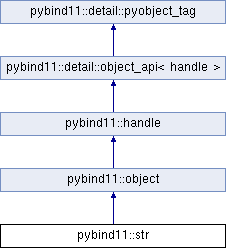 |
BoB robotics
The Brains on Board robotics library
|
 |
BoB robotics
The Brains on Board robotics library
|

Public Member Functions | |
| __attribute__ ((deprecated("Use reinterpret_borrow<""str"">() or reinterpret_steal<""str"">()"))) str(handle h | |
| str (handle h) | |
| operator std::string () const | |
| template<typename... Args> | |
| str | format (Args &&...args) const |
 Public Member Functions inherited from pybind11::object Public Member Functions inherited from pybind11::object | |
| __attribute__ ((deprecated("Use reinterpret_borrow<object>() or reinterpret_steal<object>()"))) object(handle h | |
| object (const object &o) | |
| Copy constructor; always increases the reference count. | |
| object (object &&other) noexcept | |
Move constructor; steals the object from other and preserves its reference count. | |
| ~object () | |
Destructor; automatically calls handle::dec_ref() | |
| handle | release () |
| object & | operator= (const object &other) |
| object & | operator= (object &&other) noexcept |
| template<typename T > | |
| T | cast () const & |
| template<typename T > | |
| T | cast () && |
| object (handle h, borrowed_t) | |
| object (handle h, stolen_t) | |
| template<typename T > | |
| T | cast () const & |
| template<typename T > | |
| T | cast () && |
| template<> | |
| void | cast () const & |
| template<> | |
| void | cast () && |
 Public Member Functions inherited from pybind11::handle Public Member Functions inherited from pybind11::handle | |
| handle ()=default | |
The default constructor creates a handle with a nullptr-valued pointer. | |
| handle (PyObject *ptr) | |
Creates a handle from the given raw Python object pointer. | |
| PyObject * | ptr () const |
Return the underlying PyObject * pointer. | |
| PyObject *& | ptr () |
| const handle & | inc_ref () const & |
| const handle & | dec_ref () const & |
| template<typename T > | |
| T | cast () const |
| operator bool () const | |
Return true when the handle wraps a valid Python object. | |
| __attribute__ ((deprecated("Use obj1.is(obj2) instead"))) bool operator | |
| template<> | |
| void | cast () const |
 Public Member Functions inherited from pybind11::detail::object_api< handle > Public Member Functions inherited from pybind11::detail::object_api< handle > | |
| iterator | begin () const |
| iterator | end () const |
| Return a sentinel which ends iteration. | |
| item_accessor | operator[] (handle key) const |
| item_accessor | operator[] (const char *key) const |
| See above (the only difference is that they key is provided as a string literal) | |
| obj_attr_accessor | attr (handle key) const |
| str_attr_accessor | attr (const char *key) const |
| See above (the only difference is that they key is provided as a string literal) | |
| args_proxy | operator* () const |
| object | operator* (object_api const &other) const |
| bool | contains (T &&item) const |
Check if the given item is contained within this object, i.e. item in obj. | |
| object | operator() (Args &&...args) const |
| __attribute__ ((deprecated("call(...) was deprecated in favor of operator()(...)"))) object call(Args &&... args) const | |
| bool | is (object_api const &other) const |
Equivalent to obj is other in Python. | |
| bool | is_none () const |
Equivalent to obj is None in Python. | |
| bool | equal (object_api const &other) const |
| Equivalent to obj == other in Python. | |
| bool | not_equal (object_api const &other) const |
| bool | operator< (object_api const &other) const |
| bool | operator<= (object_api const &other) const |
| bool | operator> (object_api const &other) const |
| bool | operator>= (object_api const &other) const |
| object | operator- () const |
| object | operator- (object_api const &other) const |
| object | operator~ () const |
| object | operator+ (object_api const &other) const |
| object | operator+= (object_api const &other) const |
| object | operator-= (object_api const &other) const |
| object | operator*= (object_api const &other) const |
| object | operator/ (object_api const &other) const |
| object | operator/= (object_api const &other) const |
| object | operator| (object_api const &other) const |
| object | operator|= (object_api const &other) const |
| object | operator& (object_api const &other) const |
| object | operator&= (object_api const &other) const |
| object | operator^ (object_api const &other) const |
| object | operator^= (object_api const &other) const |
| object | operator<< (object_api const &other) const |
| object | operator<<= (object_api const &other) const |
| object | operator>> (object_api const &other) const |
| object | operator>>= (object_api const &other) const |
| __attribute__((deprecated("Use py::str(obj) instead"))) pybind11 str_attr_accessor | doc () const |
Get or set the object's docstring, i.e. obj.__doc__. | |
| int | ref_count () const |
| Return the object's current reference count. | |
| handle | get_type () const |
Public Attributes | |
| bool | is_borrowed: object (is_borrowed ? object (h |
| bool | borrowed_t |
| bool | int |
 Public Attributes inherited from pybind11::object Public Attributes inherited from pybind11::object | |
| bool | is_borrowed: handle(h) { if (is_borrowed) inc_ref() |
|
inlineexplicit |
\rst Return a string representation of the object. This is analogous to the str() function in Python. \endrst
| bool pybind11::str::int |